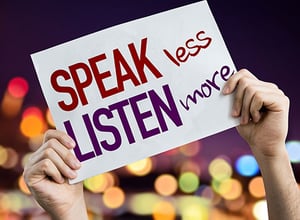
With over 25 million copies sold, chances are high that you have read the business and self-help book “The 7 Habits of Highly Effective People” written by Stephen Covey.
It has been referred to as a masterpiece, a life changer, a simple and effective book that has influenced millions, and those are only some of the praises you can find on the back of the book.
I recently completed one of Beekley Medical®’s continuous learning courses that focuses on this book. Before the class I was a self-help skeptic, I didn't see how this book, despite its popularity, could help as many people as it claimed to.
However, after reading and applying some of the 7 habits to both my personal and professional life, I can honestly say that the lessons I learned will be with me for some time to come.
The 7 habits in that Covey covers in his book aren't revolutionary in any way. In fact they are quite the opposite - timeless principles of ethics that focus on being the best person you can be and treating others with fairness, respect and dignity.
I won't reflect on all seven, but these are the three that resonated with me the most.
Be proactive - the lynchpin of all the 7 habits
 One of Covey’s goals for this book is to teach individuals how to be effective in attaining goals by aligning oneself to what he calls “true north” principals based on character ethics such as fairness, integrity, honesty, truthfulness, and being respectful.
One of Covey’s goals for this book is to teach individuals how to be effective in attaining goals by aligning oneself to what he calls “true north” principals based on character ethics such as fairness, integrity, honesty, truthfulness, and being respectful.
He teaches you how to focus on your “circle of influence” or things that you can do something about, as well as choosing your response to things you cannot control or the “circle of concern".
This is a key part of the first habit “Be Proactive.”
Jane Reik, Beekley's Talent Manager and facilitator of this continuous learning program is often asked which habit it the most important. “Habit 1 is, undoubtedly, the foundation for leadership at home or at work because if begins with the mindset 'I am responsible for me, and I can choose.'”
All the habits outlined in Covey's book are dependent upon being proactive. This becomes the base of applying the habits to your everyday life. It's knowing you can choose how you respond to stimuli or circumstances you cannot control. Instead of being a victim of circumstance, you become the product of your decisions and in a sense, gain control.
According to Covey - this freedom to choose how you respond is your greatest power...
This habit is one that I try to use every day. Just like anything, it takes practice and the willingness to change, so it can be difficult sometimes. However, I think the more you put any of these habits to use, the easier they become.
Learn to listen with empathy
Another of the seven habits that really resonated with me is the fifth habit, seeking first to understand before seeking to be understood.
 Maybe because my professional background is marketing, but I believe that communication is one of the most important skills in life. Part of being a great communicator is listening. More importantly, to listen in order to understand.
Maybe because my professional background is marketing, but I believe that communication is one of the most important skills in life. Part of being a great communicator is listening. More importantly, to listen in order to understand.
I’m sure you can think of conversations in which either you or another person were only hearing certain parts of a conversation, or truly listening but missing the meaning of what was being said.
It happens to everyone. Learning to be an empathetic listener and putting yourself second, or even third or fourth, gives more meaning to your communicating.
I see this at work a lot in my interactions with our Beekley Sales team.
Overhearing phone conversations between them and their customers, I hear them asking questions to better understand their client's personal realities in order to provide a value-added service - even if that means not making a sale.
This was particularly evident at the start and during the pandemic. The sales team reached out to customers with useful information on how other imaging centers were handling first shut down of all non-essential exams, and then reopening with new restrictions and sanitary measures in place.
The focus was on helping our customers navigate this crisis, not on selling product.
The sales team actively used the ten steps to becoming an empathetic listener described in Covey's book, which included putting their own agenda aside, appreciating other points of views, imagining themselves in their customer’s positions, and being sensitive to their feelings. Since everyone at Beekley takes our 7 Habits course, I’m willing to bet some of this was learned during their time in the course.
Take care of yourself - why it's so important to "sharpen the saw"
Imagine you are in the forest when you come upon a man sawing down a tree. You ask what he is doing, and he tells you he is sawing down a tree. You ask how long he has been at it and with sweat dripping down his face he says about 3 hours. You mention his saw looks dull and he should sharpen it, his response “I can’t, I’m too busy sawing.”
The point of this parable is that the dull blade required greater effort to keep sawing. If the man took a break to sharpen his saw, it would have made his job easier and he would have finished it sooner.
This is why Covey's 7th habit of highly effective people is to make time for ourselves - to sharpen our own saws, so to speak.
 There is no “one size fits all” approach to sharpening the saw. Reading, meditating, exercise, going to a place of worship, or sitting outside can all be a way of taking care of yourself. When you take the time to do something for yourself, the results can have a positive impact on you personally or professional for days to come.
There is no “one size fits all” approach to sharpening the saw. Reading, meditating, exercise, going to a place of worship, or sitting outside can all be a way of taking care of yourself. When you take the time to do something for yourself, the results can have a positive impact on you personally or professional for days to come.
Beekley acknowledges this and encourages its Associates to take the time to "sharpen their saws."
In addition to a variety of continuous learning courses that focus on personal as well as professional development, Beekley also employs a Corporate Wellness Coordinator who holds sessions on mental and physical health, has an onsite gym for use throughout the day, provides ample paid time off for Associates to use as they see fit, and an overall positive atmosphere where having fun is considered a core value - that its as important to play and have a work/life balance as it is to work hard and make footprints.
Recipe for success
There is a quote from Joel Peterson, chairman of JetBlue Airways, in the beginning of 2013 edition of this book that says “…Its lessons are life lessons worthy of 24/7 consideration."
I think this sums up "The 7 Habits of Highly Effective People" very well.
After learning about each habit and trying to implement them into daily life, I feel there is no way you can fail.
Related articles:

Megan Sargalski
Marketing Communications Specialist
